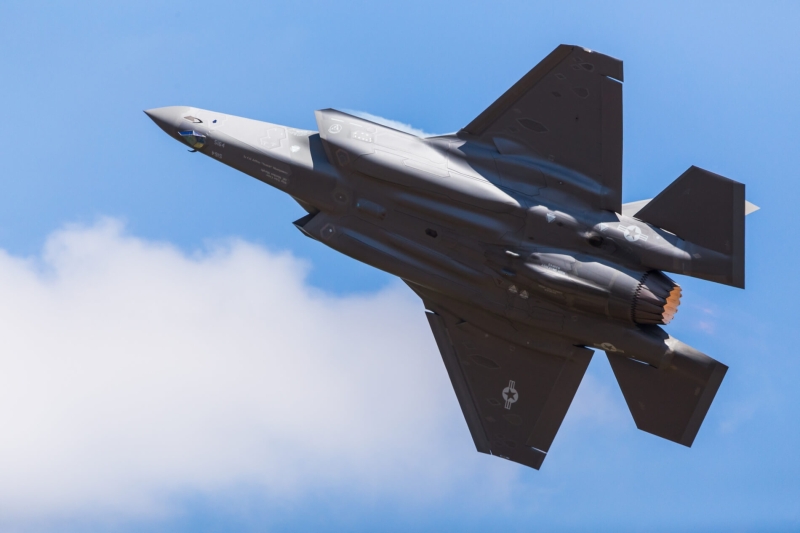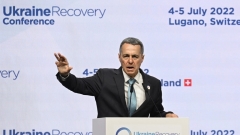F-35 Initiative Committee threatens invalidity and hopes for express vote
Next month, the F-35 initiative will be deposited with the federal government. Parliament could make them obsolete as early as autumn - there is even a risk of invalidity.
In Switzerland, 100,000 signatures are required to submit a popular initiative. However, the signatures alone are not enough: they have to be "certified", i.e. officially checked and confirmed by the municipality of a voter. For parties, organizations and committees, this means two main things: a lot of work and a lot of money.
Those responsible for the F-35 initiative also know this these days: countless boxes are stacked up in the offices, full of certified signatures. Since the end of May, the left-green alliance has known that it has broken the 100,000 mark. To be sure, however, you need "safety margins", of which the F-35 opponents actually have enough: On Thursday, the committee reported 116,705 signatures collected. Which begs the question: When will the initiative be submitted?
Asking them is highly explosive in connection with the F-35 procurement. The initiative wants nothing less than to stop the procurement of fighter jets, which costs 6.1 billion Swiss francs, with a ballot, the implementation of which has actually been arranged for a long time. In parliament, bourgeois forces are currently trying to push this through with a final deadline: the Federal Council is said to have signed the procurement contracts for the 36 new F-35 fighter jets by the end of March 2023. This turbo command is not yet set in stone - but if it comes through next fall, there is a risk of a political mud fight.
Federal Council needed only one month for minaret initiative
The duel will revolve around the question of how quickly the Federal Council and Parliament will make the popular initiative "ready for voting". This process can only begin once 100,000 signatures have been deposited at the Federal Chancellery. According to sources close to the committee, this should take place in August. After that, the Federal Council will have to publish its “message” and send it to Parliament, where the usual political mills will grind.
"If the political will is there, an election would be possible in March 2023," says Green National Councilor Marionna Schlatter. Not hopeful, but determined: “The minaret initiative or the Corona policy showed that the Federal Council and Parliament can work quickly if they are serious about direct democracy: as long as a purchase is not final, the population must have the right to make a bad one and reject overpriced fighter jets."
Schlatter mentions the minaret initiative because, from her point of view, the Federal Council is the biggest problem child: its so-called "message" - a multi-page document in which various legal and financial aspects of a political issue are examined - must be available before parliament can open the debate in can attack. The state government is happy to allow several months for this work. With the minaret initiative, however, the Federal Council managed to do this within a month.
If the Federal Council also succeeds in the F-35 initiative, the responsible parliamentary commission would have to discuss the explanations in no time at all, since the autumn session of parliament begins on September 12th. Both chambers will then most likely reject the initiative.
However, this is irrelevant for the voting date - the only important thing is that the National Council and the Council of States have an identical "No" to the F-35 initiative by the beginning of December at the latest. If this plan succeeds, the Federal Council could order the referendum four months before the election and schedule it for March 13, 2022.
The Green National Councilor Schlatter is convinced that this plan has a chance: "If Parliament sees reasons to force the signature for the purchase contracts before the end of March 2023, then it must not unnecessarily slow down a popular initiative at the same time." She therefore demands that the commissions, the National Council and the Council of States deal with the popular initiative on the express track.
Initiative could be declared invalid
A month ago, Federal Councilor and Defense Minister Viola Amherd told Le Temps that this was possible. However, she warned that a vote before the end of March 2023 would be "difficult" if the initiative signatures were not submitted by the end of June. A month later, this is unlikely to have changed much in favor of the F-35 opposition.
On the contrary: If the National Council also orders the signing of the purchase contract by the end of March 2023 and Parliament takes the time to discuss the F-35 initiative, the popular initiative could face a particularly rare fate: it could be declared invalid because its claim has expired cannot be implemented due to time constraints. The initiative text is directed against the current procurement and could only be understood with imagination for future F-35 procurements.
A declaration of invalidity due to the "impossibility" in the history of democratic people's rights in Switzerland has only happened once so far: after the Second World War, a committee tried to reduce Switzerland's armaments expenditure by means of a popular initiative. Had it been adopted, Parliament would have been obliged to halve army spending by 1955 or 1956 at the latest. The demand was submitted in 1954 with the necessary signatures and a year later declared by Parliament to be "objectively unfeasible" - because the state budgets for the two years had already been decided.
with information from Watson

Comments to this:








